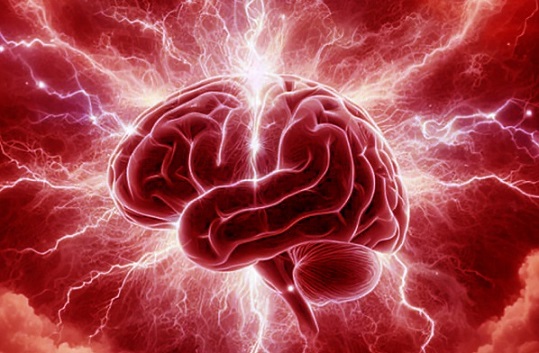COVID-19 Causes Psychosis and Schizophrenia by S Proteins Activating Epidermal Growth Factor Receptor Signaling
Nikhil Prasad Fact checked by:Thailand Medical News Team Jan 09, 2025 3 months, 4 days, 2 hours, 2 minutes ago
Medical News: The COVID-19 pandemic, caused by the SARS-CoV-2 virus, has brought about an array of health challenges, from respiratory issues to long-term complications affecting nearly every system in the body. Among these complications, neurological and psychiatric symptoms have gained increasing attention. Researchers from Wakayama Medical University and Hokkaido University in Japan have uncovered a startling connection between COVID-19, psychosis, schizophrenia, and the activation of the Epidermal Growth Factor Receptor (EGFR) by the virus's spike proteins. This
Medical News report delves into the groundbreaking findings and their implications for public health and psychiatry.
 COVID-19 Causes Psychosis and Schizophrenia by S Proteins Activating Epidermal Growth
COVID-19 Causes Psychosis and Schizophrenia by S Proteins Activating Epidermal Growth
Factor Receptor Signaling
Understanding the Epidermal Growth Factor Receptor (EGFR)
EGFR, a critical cellular receptor, plays a role in processes such as cell growth, differentiation, and survival. It has also been implicated in various diseases, including cancers and neurodegenerative disorders. The SARS-CoV-2 spike protein mimics epidermal growth factor (EGF), directly activating EGFR signaling pathways. This activation precedes the cytokine storm often associated with severe COVID-19, as described in the research conducted by Hiroyuki Nawa and Masaaki Murakami. The EGFR system’s involvement in both viral replication and the pathological responses seen in the brain has prompted a closer look at its role in psychiatric disorders.
COVID-19’s Psychiatric Impact
While respiratory symptoms dominate the clinical presentation of COVID-19, neurological symptoms like delirium, psychosis, and cognitive impairment are increasingly recognized. The researchers reviewed existing literature and conducted experimental studies, linking EGFR signaling to these symptoms. Of particular interest is how EGFR activation contributes to schizophrenia-like symptoms in both clinical and experimental settings. This article highlights their findings, emphasizing the potential mechanisms driving psychosis and schizophrenia in COVID-19 patients.
Mechanisms Linking COVID-19 and Psychiatric Disorders
The study reveals that SARS-CoV-2’s spike protein directly transactivates EGFR without requiring intermediary inflammatory processes. This action can disrupt normal neural signaling and potentially induce psychosis. Furthermore, the cytokine storm - characterized by excessive immune responses - can exacerbate EGFR activation, leading to widespread inflammation, including in the brain. Autopsy studies and imaging data from COVID-19 patients have shown structural brain changes, such as gray matter reduction in areas implicated in psychiatric conditions.
Interestingly, EGFR’s activation has been linked to both acute psychotic episodes and the onset of chronic psychiatric conditions. Previous research by the same group demonstrated that perinatal exposure to EGF in animal models induced schizophrenia-like behaviors,
such as impaired social interaction and abnormal vocalization. These findings underline the potential long-term impact of COVID-19’s EGFR-related mechanisms on mental health.
Genetic and Molecular Evidence
The research team utilized Genome-Wide Association Studies (GWAS) to identify genetic overlaps between schizophrenia and COVID-19 susceptibility. They found significant polygenic risk scores suggesting a shared molecular pathway. Elevated levels of EGFR ligands, such as heparin-binding EGF-like growth factor (HB-EGF), were observed in COVID-19 patients, correlating with disease severity and psychiatric manifestations.
Additionally, the activation of EGFR was shown to enhance the binding and internalization of the virus, suggesting a feedback loop where EGFR activation promotes both viral proliferation and psychiatric symptoms. The study provides molecular evidence supporting the hypothesis that SARS-CoV-2’s spike protein plays a central role in this pathological interaction.
Clinical Implications
The findings open new avenues for therapeutic interventions. EGFR inhibitors, such as tyrosine kinase inhibitors and monoclonal antibodies like nimotuzumab, have shown promise in reducing COVID-19 severity. Clinical trials have indicated that these drugs not only mitigate respiratory symptoms but also potentially reduce the risk of psychiatric complications. However, more research is needed to understand their long-term efficacy and safety.
For patients already exhibiting psychotic symptoms, conventional antipsychotic treatments may not address the underlying EGFR-related mechanisms. This underscores the need for targeted therapies that can modulate EGFR activity and its downstream effects. The study’s authors advocate for incorporating EGFR inhibitors into treatment protocols for severe COVID-19 cases, particularly those with neurological and psychiatric symptoms.
Conclusions and Future Directions
The study’s findings mark a significant step forward in understanding the complex interplay between COVID-19 and psychiatric disorders. By identifying EGFR activation as a key mechanism, researchers have opened the door to targeted therapies that could mitigate not only the physical but also the mental health impacts of the virus. These discoveries highlight the importance of a multidisciplinary approach to addressing the long-term consequences of COVID-19.
While the link between EGFR activation and psychiatric symptoms in COVID-19 patients is compelling, further research is needed to elucidate the exact pathways and develop effective interventions. Long-term studies following COVID-19 survivors will be crucial in determining the prevalence and persistence of these psychiatric complications.
The study findings were published in the peer-reviewed journal: Neuropsychopharmacology Reports.
https://onlinelibrary.wiley.com/doi/10.1002/npr2.12520
For the latest COVID-19 News, keep on logging to Thailand
Medical News.
Read Also:
https://www.thailandmedical.news/news/covid-19-news-sars-cov-2-infections-can-trigger-onset-of-bipolar-disorder
https://www.thailandmedical.news/news/breaking-covid-19-news-various-studies-and-case-reports-validate-that-sars-cov-2-can-cause-bipolar-disorder
https://www.thailandmedical.news/news/most-long-covid-patients-likely-to-develop-new-onset-psychiatric-disease
https://www.thailandmedical.news/news/japanese-case-study-shows-new-onset-of-schizophrenia-in-adolescent-post-covid-19
https://www.thailandmedical.news/news/even-mild-covid-19-is-causing-new-onset-of-psychiatric-disorders-in-children
https://www.thailandmedical.news/news/one-in-three-covid-19-survivors-are-diagnosed-with-a-neuropsychiatric-condition-within-six-months-of-recovery
https://www.thailandmedical.news/news/good-news-for-criminals-and-lawyers-as-new-mitigating-factor-found-study-review-validates-that-covid-19-vaccines-trigger-new-onset-psychosis
https://www.thailandmedical.news/news/covid-19-news-german-study-shows-that-covid-19-is-also-triggering-the-new-onset-of-psychiatric-disorders-in-many
https://www.thailandmedical.news/news/germany-study-uncovers-alarming-link-between-neural-autoantibodies-and-psychiatric-symptoms-in-covid-19-and-post-covid-individuals
https://www.thailandmedical.news/news/covid-19-news-new-york-doctors-warn-that-even-mild-covid-19-can-lead-to-anti-n-methyl-d-aspartate-autoimmune-encephalitis-with-psychotic-symptoms
https://www.thailandmedical.news/news/italian-researchers-warn-that-covid-19-infections-can-cause-catatonia-a-neuropsychiatric-condition
https://www.thailandmedical.news/news/breaking-covid-19-news-japanese-case-study-shows-that-sars-cov-2-infections-can-lead-to-severe-sexually-deviant-behaviors
https://www.thailandmedical.news/news/breaking-covid-19-news-italian-researchers-warn-that-sars-cov-2-infections-can-lead-to-new-onset-psychosis-expect-more-loonies-walking-around
https://www.thailandmedical.news/news/the-growing-link-between-long-covid-and-suicide-rates-in-india
